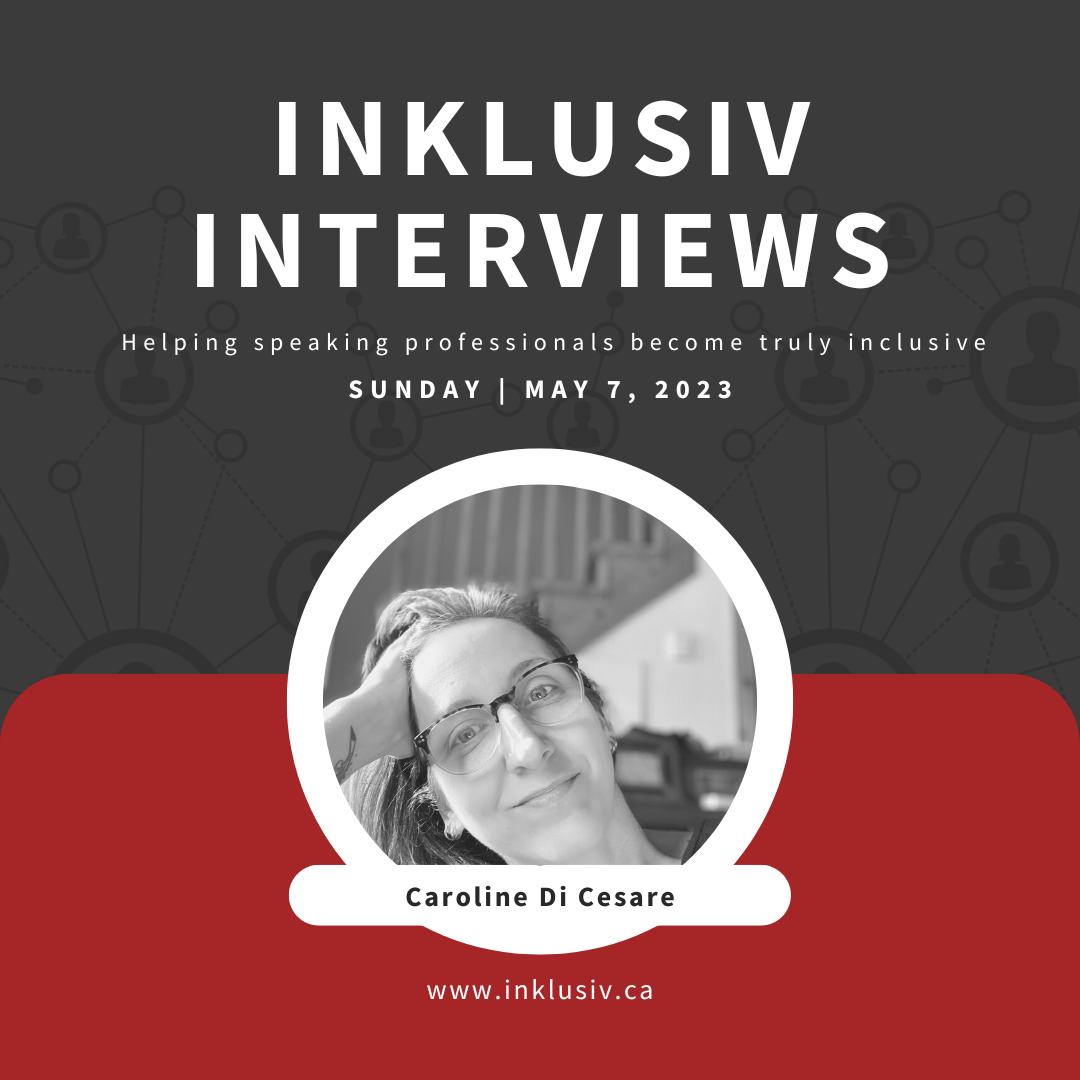Interview with Caroline Di Cesare

Every week, we meet with audience members with disabilities who are willing to come forward and share a little bit about their own personal journey and experiences, attending live, in-person, or virtual speaking or training events. Through their unique and generous perspectives, speakers, trainers, facilitators, and other communication professionals can hopefully learn about some of the things that they do well, but also (and maybe more importantly) about some of the things they could improve to provide an experience that is truly inclusive of everyone.
Meet Caroline, an audience member who deals with neurological issues
So, without further ado, let’s dive right into this week’s interview with Caroline Di Cesare (she/her). Caroline has neurological issues caused by transverse myelitis, and comes to us from Quebec, Canada.
Introductions
QUESTION 01 Can you tell us a bit about yourself, and how your disability might impact your experience, as someone who attends live in-person and virtual events?
Sure. The most disabling symptom is the dizziness that I feel in different situations, but more frequently when I move or change position. If I’m asked to get up and sit down repeatedly during an event, it quickly causes discomfort. It’s impossible for me to stand for several minutes without moving, as it makes me very dizzy. Since I’ve developed this condition, I’ve grown much more sensitive to all physical and chemical irritants.
So, for example, when there’s a strong smell of cleaning products floating in the room, it will likely cause me respiratory discomfort. If the air conditioning is too cold, or if a fan or the ventilation system is blowing air directly on me, it’s irritating to the point where concentrating becomes impossible, as the discomfort becomes overwhelming.
My neurological issues also left me with photophobia, and big neon lights make me feel nauseous. I use adaptive glasses to offset this effect, but it doesn’t completely solve the problem.
Things that ruin the experience
QUESTION 02 Thinking back on some of your experiences attending in-person or virtual events, what are some of the worst things speakers, trainers, and other communication experts can do to ruin your experience as an attendee?
These neurological issues have turned me into a very sensitive person, and adapting to all the surrounding irritants takes up a lot of my energy. All that energy that I have to dedicate to adapting to my surroundings can’t be invested towards enjoying my experience and new learning opportunities. I’ve experienced various types of discomforts during presentations and workshops as a result of my condition: uncomfortable chairs that too close to one another, strong smells of chemical cleaning products or fragrances, very bright lights, presentations or speeches that last for too long, etc.
Things that make a positive impact
QUESTION 03 Can you share some of the great things speakers, trainers, and other communication experts sometimes do that make a positive impact on your ability to fully enjoy your in-person or virtual event experiences?
I appreciate speakers who are quick to adapt to their audience, and offer them opportunities to opt out of activities, when they don’t feel comfortable partaking. For example, if the speaker asks the attendees to stand up, dance, turn, or jump on one foot while tapping themselves on the head, I appreciate them making it clear that it’s perfectly all right for those who don’t feel comfortable doing so to remain seated. Those who can might be happy to comply but those who aren’t shouldn’t be made to feel bad to remain seated. The environment is also very important to me: I can enjoy myself a lot more when the environment avoids all sorts of extremes; the audio coming from the speakers is not too loud, the lighting is mostly coming form natural sources, the temperature is just right, etc.
Sharing a piece of advice
QUESTION 04 If you had one piece of advice to give speakers, trainers, and other communication experts, so their content became more inclusive of people who have disabilities, what would it be?
A few things come to mind:
- Visiting the room prior to presenting and ensuring that it is well-accommodated and devoid of overwhelming stimuli.
- Avoid creating extreme experiences, and remember that not everyone will be comfortable taking part in more physical activities. Remind people that it’s ok to opt out.
- Throughout the event, listen, pay attention, and adapt as you go. IF it’s not possible, learn from the experience and commit to doing better next time!
Wrapping up
QUESTION 05 Thank you for sharing some of your insights with us today. As we wrap up our conversation, is there anything that you’d like to add, such as another thought, another piece of advice, another perspective, etc.?
No, that’s about it. Thank you for the opportunity to share my experience, so speakers can hopefully learn to do better.
Connect with our guest on social
Interested in knowing more about our guest this week? You can follow Caroline on Facebook.

About Denis Boudreau
Denis Boudreau is a consultant, trainer, and speaker specializing in digital accessibility and disability inclusion. He works with organizational leaders who want to equip their teams with the skills to create accessible websites and digital products – so no one is left behind. A Certified Professional in Web Accessibility (CPWA), Denis has trained thousands of web professionals over the past 20+ years and delivered hundreds of workshops in both English and French. He has helped leading brands like Netflix, Salesforce, and Victoria’s Secret embed accessibility into their digital strategies, empowering them to meet legal obligations, improve user experience, and connect with more people, more effectively.
